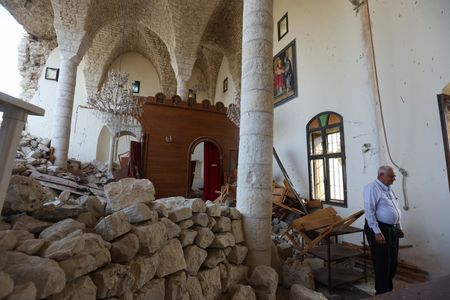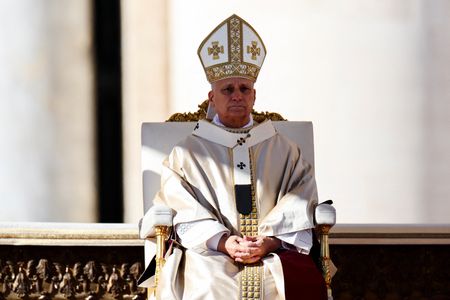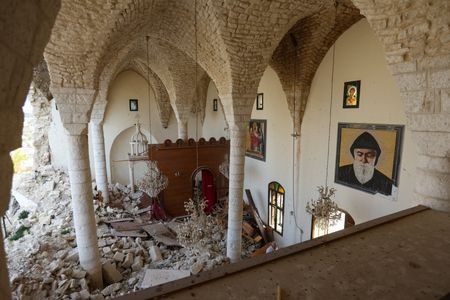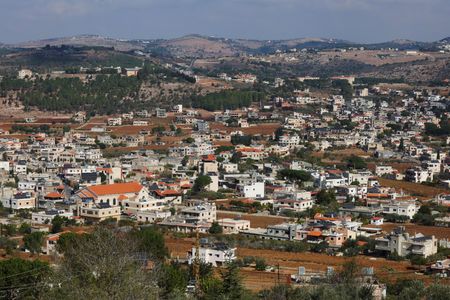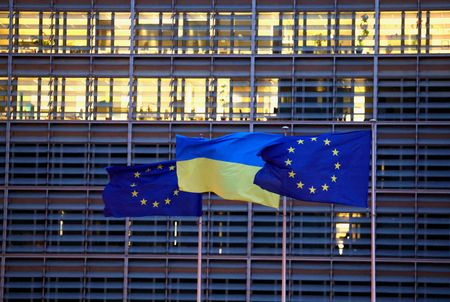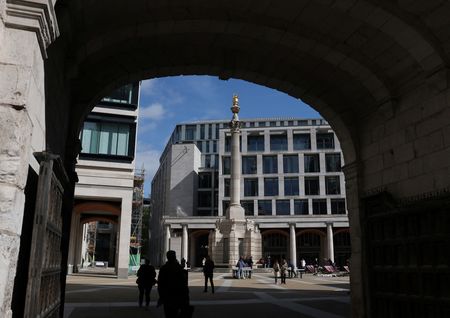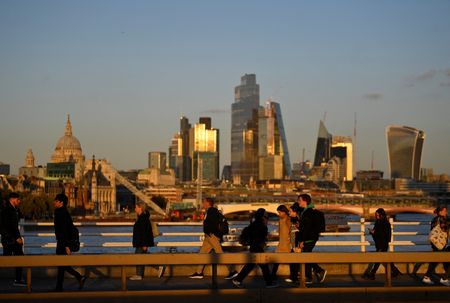By Maya Gebeily and Emilie Madi
RMEISH, Lebanon (Reuters) -After decades of conflict, residents of the Christian town of Rmeich in Lebanon’s war-battered south hope Pope Leo’s upcoming trip to their country will bring peace – and the strength to stay as the region’s Christian communities dwindle.
Nestled on Lebanon’s southern border with Israel, Rmeich has been home to Catholics for more than 300 years. Today, it is ringed to the south by Israeli military posts, and to its north by predominantly Muslim villages pummelled by Israeli air strikes during last year’s deadly war.
On a recent morning, hymns sung by around 30 congregants echoed against the stone walls of St. George Church, a Maronite Catholic parish founded in 1740 that still serves Rmeich’s 6,000 residents.
Rev. Najib Amil said Leo’s visit to Lebanon, which has the region’s highest proportion of Christians, could encourage the Middle East’s Catholics to remain in the region.
“The first visit (Leo) decided to make as pope was to Lebanon. That’s proof he cares very much about Lebanon and especially the Christians here – because if the Christians of Lebanon leave, there won’t be any more Christians in the Middle East. That much is clear,” Amil told Reuters.
Christianity has declined in its Middle Eastern birthplace from around 20 percent of the region’s population a century ago to about five percent today, and falling.
Christians are still believed to make up roughly a third of Lebanon’s five million people, though there has been no official census for nearly a century due to religious and political sensitivities.
WALKING THE PATH OF JESUS
Rmeich surprisingly emerged unscathed from the last two turbulent years in Lebanon.
Lebanese Shi’ite Muslim group Hezbollah launched rockets at Israeli troops a day after the October 7, 2023, attack on Israel by the militant Palestinian group Hamas. Hezbollah’s rocket fire wreaked havoc on towns in northern Israel and Israel’s retaliatory bombardment of southern Lebanon left most Shi’ite towns there in ruins and emptied of people.
To spare Rmeich from the Israeli strikes, residents asked Hezbollah fighters not to launch missiles from the town, Amil said. While many in Rmeich fled to the capital, hundreds stayed on, fearing militants would occupy the town if they left.
Leo’s three-day trip to Lebanon will skip the south. Israel’s military still occupies hilltop posts there and bombs locations it says are Hezbollah arms depots.
On Sunday it killed Hezbollah’s top military official in a strike on the outskirts of Beirut. There was no immediate response from the Vatican on whether that strike would prompt amendments to the papal visit. Lebanon’s presidency told Reuters no changes were planned as of Monday.
“We hope the pope’s visit to Lebanon will be a message to put a limit to these wars,” said Rmeich Mayor Hanna Amil. He said around 200 Rmeich residents would attend Leo’s main Mass in Beirut.
“We would have loved… him to visit us in the south too, especially as our Lord the Messiah passed through these lands – then the Pope would have walked the path of Jesus.”
Jesus’s first miracle – turning water into wine at Cana of Galilee, according to St. John’s Gospel – is thought to have taken place in the southern Lebanese town of Qana, where Israeli strikes in 1996 and 2006 killed dozens.
PRAYING FOR PATIENCE
Rmeich is struggling to restore normal life.
Its schools once counted hundreds of students from nearby Shi’ite Muslim villages as pupils. But with those villages in ruins, few families have returned and Rmeich’s schools have seen tuition revenues shrink, Mayor Amil said.
The Israeli military is also enforcing no-go zones on swathes of land where Rmeich residents own olive groves and tobacco fields, meaning farmers need permission from the Lebanese army and U.N. peacekeepers to go there.
Three years of harvests have gone mostly unpicked.
Further north in the town of Dardaghiya, 22 km (13 miles) from the border, Rev. Elia Kamel winced as he surveyed the gutted ruins of the St. George Melkite Catholic Church.
On October 9, 2024, an Israeli warplane struck the adjacent parish hall, sending its concrete columns crashing into the church roof and spilling rubble across the aisles and up to the altar.
The church has yet to be repaired due to a lack of funds.
“Since the (hall) was hit… we haven’t had a single Mass in this church,” Kamel said.
“This is our life. The Messiah tells us that you have to be patient and that always, after your patience, comes relief. But when?”
(Reporting by Maya Gebeily and Emilie MadiEditing by Gareth Jones)

